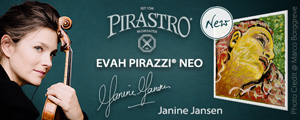We have thousands of human-written stories, discussions, interviews and reviews from today through the past 20+ years. Find them here:
How to Win an Audition for the Los Angeles Philharmonic
I have been a tenured member of the Los Angeles Philharmonic for the last 30 years, and over those three decades, I have served on many audition committees.
I have identified some powerful patterns that are helpful to those who are preparing for and taking auditions at the highest levels.
And sitting on many of those committees with our maestro Gustavo Dudamel, I've also heard his thoughts about it. Here is a little a backstage conversation we had last year at Walt Disney Concert Hall, on the topic of auditions, audition nerves, and what we are looking for in a candidate:
Gustavo certainly speaks to the poetry of it all: "We fight for the perfection, which doesn't exist," he said. "The real action of music is about beauty, and in an orchestra, beauty is about playing together, listening to each other, thinking differently but connecting with one idea. For me this is the most essential thing."
Of course, that is assuming that a candidate comes with that high degree of technical ability. It is crystal clear to all of us that the five basic elements of musicianship need to be present in everything that a candidate performs at their audition:
- Rhythm
- Intonation
- Sound Quality
- Articulation
- Phrasing

To elaborate on those five elements:
1. Rhythm - Please don’t rush...
Rhythm is a first priority in an audition. Someone who "plays in the pocket" rhythmically is given high marks right off the bat.
2. Intonation - A question of physics? Is the needle straight up on the tuner?
If you can play Shostakovich 5 perfectly in tune, you are already ahead of the game. Drone practice should be part of your daily practice, but don’t go down the "rabbit hole." In your daily drone practice, set a count down timer for 120 seconds. Do a different passage every day.
3. Sound Quality - Strive for the most resonant and beautiful sound.
The criteria for us when we hear an audition: "Is that someone that I want to sit next to for the next 30 years?" Because actually, I will be sitting next to that person for the next 30 years. Can I blend with their sound?
4. Articulation - How do you begin and end each note?
Are your right-hand articulations accurate? For example, are Mendelssohn Scherzo, Mozart Haffner and Brahms-Haydn Variation 5 spiccato strokes uniquely appropriate and distinctly different?
5. Phrasing - How do we group notes?
Commas matter. Let’s eat Bob. Let’s eat, Bob. Show your experience and your understanding of an excerpt by demonstrating the proper phrasing of an excerpt.
In addition to the five basic elements of musicianship, here a few more important considerations:
What if I make a mistake in an audition?
First of all, don't make a completely mistake-free performance your number-one priority. As Gustavo said, when you are playing "not to make a mistake," then "there is already a mistake, because the mistake is thinking that way....Change that way of thinking."
And if you do make a mistake during the audition, don’t panic. I promise that your perception of a mistake is a little distorted. Move on. Make the next note, the next phrase, the next excerpt even more beautiful than anything that preceded it. We give positive consideration to candidates who show poise and resilience.
How can I get "bonus points" in an audition?
First of all, let me assure that yes, you can get bonus points. If you demonstrate experience and musical understanding in the performance of your excerpts, you will be given bonus points (even though they may be given subconsciously.) There are many phrase endings, articulations and musical nuances that are idiomatic. If you can capture these things, you will get bonus points.
If you can show us your artistry, you are in. Well I can’t really promise that, but I can tell you that if you move us musically as a committee, you have vastly improved your chances. If you have fun as a performer, then we have fun as listeners.
Can I a capture something as elusive as artistry in something so pesky and unnerving as an audition?
It's easy to tell you: "Have fun!" But is there anything so un-fun as trying to have fun? It is something that you need to practice. Animation, imagination, emotion, narration are all elements of the joy of being a musician. If you can demonstrate artistry under the pressure of an audition for a major orchestra, you have vastly improved your chances of winning.
I'll leave you with some inspiring words from Gustavo. He told me that the engine driving his own inspiration "is that very first moment when I was in an orchestra, when I was a child. That sound - it created in me a desire of doing this for the rest of my life, an internal motivation."
In our every-day routine of trying to deliver something on a high level, "we forget sometimes about that desire," he said. "It's something that is essential in doing something artistic: The desire to discover, the desire to share, the desire to connect, the desire to play this piece and the desire to create something. For me that is everything."
* * *
If you would like more information about my eight-week class for advanced violists called Audition DeCoder, please click here.
You might also like:
- Orchestral Excerpts Master Class with Violinist Nathan Cole at Sounding Point Academy
- NY Phil Audition Challenge: Don Juan
- Strategies for Fixing Last-Minute Errors in Violin Performances and Auditions
* * *
Enjoying Violinist.com? Click here to sign up for our free, bi-weekly email newsletter. And if you've already signed up, please invite your friends! Thank you.
Replies
Several good points are made here by both MW and GD. One important ingredient that i would add to the basic five listed above as essential for successful auditioning is the utmost respect for the text, by which i mainly mean precision in observing composers’ indications of volume and character. Besides, any significant distortion of tempo is a warning signal for me, because with easy availability of recordings these days even inexperienced players should know what is the desired speed of each orchestral excerpt, at least approximately.
this is basically an advertisement for his own audition coaching business, but, granted, at least this is a (mildly) interesting advertisement.
I appreciate that the ‘five elements of musicianship” list has rhythm at the top, because it was my experience in 30+ years of sitting on audition committees (albeit not LA Phil level), we would forgive an occasional intonation imperfection much more quickly than a rhythmic error. And to the advice “don’t rush,” I would add “don’t turn dotted rhythms into triplets” (such as in Mozart 39 2nd movement), and “give every rest its exact value.” It’s jarring to hear a candidate come in sooner or later than expected after a measure or two of rest. (Usually the long rests of many measures duration are cut out of the excerpt but if not, or if in your concerto, count one or two measures of rest and then come in on the proper beat. Nobody wants to listen to twenty measures of silence.)
I must respectfully disagree with Mark about observing composers’ tempo indications when it comes to Beethoven’s metronome markings, which are often much faster than current accepted tempos. In that case you are much better off demonstrating knowledge of how the piece is typically performed in concert halls today.
Actually, dear Mary, you are agreeing with me! If you look at my comment a little bit more carefully, you will see that i never said anything about composers’ metronome markings but only about their “indications of volume and character”. Not only that, but i also specifically advised to rely not on metronome markings but on recordings when it comes to “desired speed”. So, thank you for agreeing with me and please next time respect my text too!
Jean, when it comes to orchestra auditions, I feel that string players would be lucky to get coaching advise from Mick and/or Dudamel, paid or free. So....you're welcome!
This article has been archived and is no longer accepting comments.














October 16, 2024 at 10:07 PM · Mick - thanks for posting your thoughts on auditions. I hope this will be helpful to all of the folks out there who are going to audition. I thought the point about perfection and mistakes was particularly important. Many people are so terrified of making a mistake that they really have no idea how to recover from it. You have shown them a pathway.